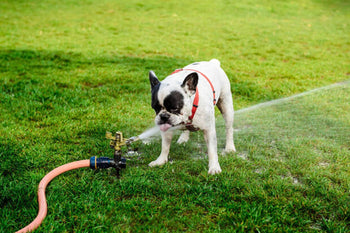Can Your Dog Drink Too Much Water?

“Water intoxication” causes a life-threatening condition called hyponatremia!
It was a fun day at the lake, with a friend’s dog repeatedly diving after his favorite ball. When it came time to leave, the dog seemed a little shaky, but with all that running and swimming, who wouldn’t be? But at home he was worse. He stumbled around, vomited a bunch of water and collapsed. Could it be bloat? It didn’t seem to be, but just in case she rushed him to the veterinarian. That saved his life.
It wasn’t bloat, but something both dogs and people can get from drinking too much water. “Water intoxication” causes a life-threatening condition called hyponatremia (excessively low sodium levels). As the electrolyte levels drop, blood plasma thins and the brain and other organs start to swell. The swollen brain is restricted by the skull and serious problems develop. It’s actually a little more involved; hemoglobin levels decrease, there’s a rapid loss of sodium and chloride, the major organs to swell are the liver and brain, and certain minerals and nutrients are lost through urination. So the major problems are basically 1) too much fluid in the body and 2) rapid loss of chloride causing an electrolyte imbalance.
An affected dog may start to stagger and vomit water. Other early signs are lack of coordination, lethargy, nausea, bloating, vomiting, dilated pupils, glazed eyes, light gum color, and excessive salivation. Advanced signs include difficulty breathing, collapsing, loss of consciousness, and seizures.
Without treatment small dogs can die within 3 to 4 hours, and large dogs within 6 to 8 hours, after passing the “too-much” level. This is an extreme emergency, yet most owners don’t recognize it. They think their dog exercised too much or they just don’t know—and they wait and see with disastrous results. Even veterinarians may not recognize the problem unless the owner tells them the dog may have ingested large amounts of water. Blood tests will identify the condition but by the time the dog arrives at the clinic there may not be time to wait for even those results. Treatment typically includes intravenous electrolytes to replace lost ones, diuretics to rid the body of excess fluid, and drugs to reduce brain swelling. Even with aggressive treatment not all dogs survive.
What about home treatments? Some people have suggested giving dogs electrolyte solutions, but they’re probably not effective. Studies have shown that saline solution (which are the most effective IV treatment) are not effective when given orally. Nor are orally administered diuretics effective. Your best bet to save your dog is to rush the dog to the closest emergency clinic.
Water intoxication accounts for several dog deaths every year—probably more than are reported. It happens most often in dogs that play in water for long stretches during warm weather. The dogs may continuously gulp down a few sips as they play and rest, inadvertently swallow water as they repeatedly retrieve, or they can even drink too much when playing water games, such as snapping at water from a lawn sprinkler or hose.
Although any dog can be affected, some seem to be at greater risk than others:
- Small dogs, which require proportionately less water to be affected.
- High energy dogs, which tend to be more persistent in play and continue to retrieve and grab at water longer than low energy dogs.
- Thinner dogs, which have less body fat with which to absorb extra fluid in the body.
- OCD (obsessive-compulsive) afflicted dogs, which can be come obsessed with drinking or with catching streams of water.
- Kidney-compromised dogs
What if your dog drinks salt water? That has its own problems, starting with severe diarrhea. First, it has an osmotic effect, drawing fluid into your dog’s intestines and causing severe diarrhea, even to the point of dehydration. Greater levels of salt water ingestion can lead to incoordination and seizures. Remember, there’s a reason people stranded on life rafts in the middle of the ocean die from lack of water—or conversely, from giving in and drinking sea water.
So what to do, to avoid this from happening to your dog? For most of us, nothing. Don’t get scared and take away your dog’s water bowl. Under everyday circumstances your dog should have access to unlimited water. But under a few circumstances, such as a dog with protracted vomiting and diarrhea, or a dog that is gulping what appears to be copious quantities, it may be prudent to dole out the water carefully. And during exercise periods, make your dog take a break every 15 minutes for 15 minutes. Avoid throwing items into water that don’t allow your dog to close its mouth against water, and especially hold off on underwater retrieving. If your dog is obsessed with catching water from sprinklers, turn them off before leaving your dog in the yard with them. If your dog drinks water obsessively, measure what he drinks and prevent him from ingesting excessive amounts. Most of all, recognize the signs of water intoxication—and be ready to act on them.








